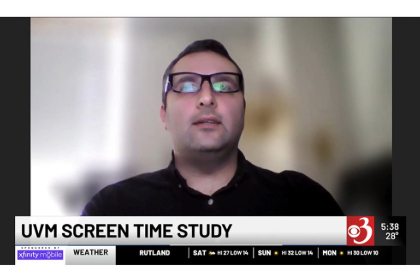(FEBRUARY 2, 2024) Bader Chaarani, Ph.D., assistant professor of psychiatry, spoke with WCAX-TV about a new five-year federal grant supporting research to investigate the impact of screen time on adolescent mental health and brain development.

Bader Chaarani, Ph.D., assistant professor of psychiatry
(FEBRUARY 2, 2024) Bader Chaarani, Ph.D., assistant professor of psychiatry, spoke with WCAX-TV about a new five-year $2M National Institutes of Health (NIH) grant supporting research to investigate the impact of screen time on adolescent mental health and brain development utilizing data from the ongoing Adolescent Brain Cognitive Development Study (ABCD).
This comprehensive grant will help Chaarani’s team examine screen time while controlling for other important factors, such as age differences, subtypes of screen time, gender disparities, puberty, sleep disorders, and substance use disorders.
Chaarani's prior research on impulse control and working memory in gamers laid the foundation for securing funding for this project. The research into video games spurred Chaarani to develop an intriguing hypothesis, to be addressed by the findings from this grant. The team postulates that, contrary to popular belief, limited screen time—especially active screen time like video gaming—might enhance children's cognition while not negatively affecting mental health.
“As a video game enthusiast, I am thrilled to be leading this project that will analyze one of the largest and most comprehensive longitudinal datasets to uncover both the beneficial and detrimental impacts of screen time categories,” stated Chaarani. “Our goal is to provide valuable insights that can reshape best practices surrounding digital media use in children and adolescents.”
Read full story
at
WCAX-TV